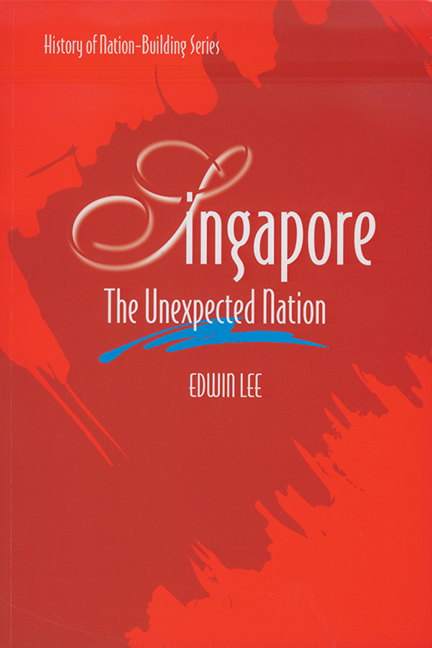Book contents
- Frontmatter
- Dedication
- Contents
- Preface
- Introduction by Wang Gungwu
- Chapter One Beginnings: From Temasek to Singapore
- Chapter Two Race, History and Nationalism
- Chapter Three Contestants and Contesting Visions
- Chapter Four The Accidental Chief Minister
- Chapter Five The Terminal Chief Minister
- Chapter Six The Embattled Prime Minister
- Chapter Seven Merger: Contesting Ownership and Principles
- Chapter Eight Terms of Disendearment
- Chapter Nine Dare to be Equal
- Chapter Ten The Way to Survive
- Chapter Eleven National Service: The Price of Independence
- Chapter Twelve Politics of Education
- Chapter Thirteen Home Ownership, National Stability and the New Middle Classes
- Chapter Fourteen University and Nation
- Chapter Fifteen Toh's Nation-Building Thrust
- Chapter Sixteen Nantah: Between Community and Nation
- Chapter Seventeen Self-Renewal: Talents for a Tough Act
- Chapter Eighteen The Consensual Prime Minister
- Chapter Nineteen Confucianism, Christianity, Chineseness
- Chapter Twenty Singapore Dreams, Singapore Dilemmas
- Chapter Twenty-One The Hyphenated Singaporean
- Chapter Twenty-Two The Unexpected Nation
- Bibliographical Note
- Index
- The Author
Chapter Five - The Terminal Chief Minister
Published online by Cambridge University Press: 21 October 2015
- Frontmatter
- Dedication
- Contents
- Preface
- Introduction by Wang Gungwu
- Chapter One Beginnings: From Temasek to Singapore
- Chapter Two Race, History and Nationalism
- Chapter Three Contestants and Contesting Visions
- Chapter Four The Accidental Chief Minister
- Chapter Five The Terminal Chief Minister
- Chapter Six The Embattled Prime Minister
- Chapter Seven Merger: Contesting Ownership and Principles
- Chapter Eight Terms of Disendearment
- Chapter Nine Dare to be Equal
- Chapter Ten The Way to Survive
- Chapter Eleven National Service: The Price of Independence
- Chapter Twelve Politics of Education
- Chapter Thirteen Home Ownership, National Stability and the New Middle Classes
- Chapter Fourteen University and Nation
- Chapter Fifteen Toh's Nation-Building Thrust
- Chapter Sixteen Nantah: Between Community and Nation
- Chapter Seventeen Self-Renewal: Talents for a Tough Act
- Chapter Eighteen The Consensual Prime Minister
- Chapter Nineteen Confucianism, Christianity, Chineseness
- Chapter Twenty Singapore Dreams, Singapore Dilemmas
- Chapter Twenty-One The Hyphenated Singaporean
- Chapter Twenty-Two The Unexpected Nation
- Bibliographical Note
- Index
- The Author
Summary
Lim Yew Hock succeeded Marshall as chief minister in June 1956 and served for the remainder of the tenure of the Rendel Constitution. He went out as chief minister together with the constitution in June 1959.
A Straits Chinese educated in English in local schools, he had worked successively as a clerk, stenographer, private secretary, and trade unionist. He was the general secretary and then president of the Singapore Trade Union Congress (STUC). He went on a British Council scholarship to England and Wales to study the trade union and cooperative movements. The unions grouped under his STUC represented the English-educated workforce of multiracial Singapore, comprising mainly the Chinese, Malays, Indians, and Eurasians. Lim hoped to bring these workers into a “new era” of trade unionism. He “introduced a new Labour Code to give them a better deal”.
But for all his striving for modernity, Lim was also prone to thinking and acting in a traditional Chinese way. He was paternalistic, and set great store on building consensus and bridging differences. When he became chief minister, he chose to hold concurrently the post of Minister of Labour and Social Welfare (his previous portfolio) so as to continue using his personal influence to settle trade disputes, calling both sides to his presence, and making it impossible for them to refuse a compromise without serious embarrassment or loss of face.
He was capable of behaving like a triad boss. Francis Thomas recalled: “There was an attempt to intimidate PAP helpers by a thug attack” during one by-election.
Chinese high school student rebels soon got a taste of his robust methods. On one occasion, students in a certain Chinese high school decided to boycott classes and camp out in their school field instead. Lim requested the governor to send for the police commissioner. He then got the police commissioner, who was to take no action, to cooperate with his plan. “From my own sources,” Lim wrote, “I found out that there were only two really active ringleaders in the particular school. I had their photographs, their names, and their addresses. I selected two tough and hefty men and assigned them the task of assaulting and frightening the two ringleaders away from the school”.
- Type
- Chapter
- Information
- SingaporeThe Unexpected Nation, pp. 131 - 158Publisher: ISEAS–Yusof Ishak InstitutePrint publication year: 2008

